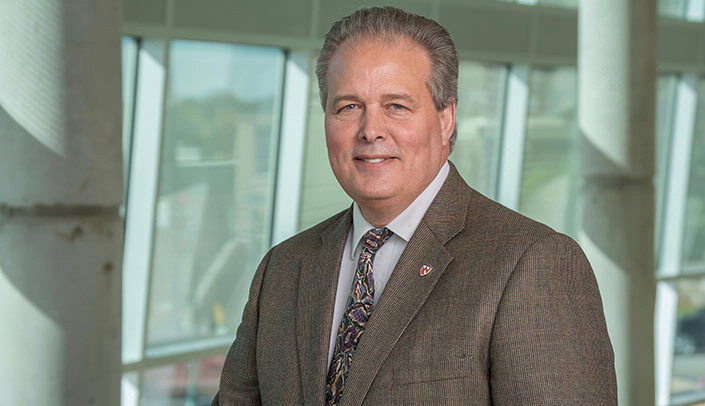Wayne Stuberg was playing center in the 1972 Shrine Bowl when he took the hit that would change his life.
“We were running a trap play, and there was a large pileup in the middle of the line,” he said. “Somewhere in that pileup, I ended up twisting my knee and suffered a ligament and meniscus injury.”
It wasn’t immediately life-changing. Dr. Stuberg, a North High standout, still went to the University of Nebraska-Lincoln to play football for coach Tom Osborne, as planned.
But to get ready to do that, he had to undergo knee surgery and physical therapy.
And while he was undergoing physical therapy, “I thought, ‘Wow, I like this,'” he said.
His life changed. And as a result, so did the lives of many others.
The Stuberg file
Personal
Education
Professional Appointments
Academic Appointments
Honors and awards
Despite his football background, he didn’t feel a calling to work with athletes. But during his clinical rotation at the Munroe-Meyer Institute in 1975, his love of physical therapy found what would become its lifelong focus: working to improve the lives of children and adults who had intellectual and developmental disabilities (IDD).
“That’s where I felt I could contribute,” he said. “That was where I wanted to make a difference.
In the mid-to-late 1970s, there were not a lot of male therapists working in the IDD field, particularly with children — Dr. Stuberg’s graduating physical therapy class at UNMC in 1977 was 35% male, and it was the largest percentage of males in the history of the school.
“Working with the kids, being able to be a role model, was something that was needed and a good thing,” Dr. Stuberg said. “The work was so fulfilling. So I went down that road, and here I am at retirement having never left it.”
As he retired at the end of 2020, Dr. Stuberg could reflect on many accomplishments. He has done clinical work, including work overseas with outfits such as Project Hope. He has done research work. He has served as an educator. He has served on the boards of state and national organizations. And, since 1987, when he became the director of the MMI Department of Physical Therapy, he has served as an administrator.
“One of the things I always enjoyed as a researcher was program development, because each research project is basically a new program,” he said. “Broadening my expertise and my impact by being in administration, especially after I became associate director of MMI in 2009, went across all the different areas of the institute.”
That’s also what drew him to become the director of the University Center for Excellence in Developmental Disabilities (UCEDD).
“Working with families as a physical therapist, you work on the physical aspect of disability,” Dr. Stuberg said. “But you quickly begin to appreciate that children grow into adults, and once they get to the point that they’re physically as independent as they can be, there are other challenges ahead — challenges having to do with the other health disciplines, with education, with post-high school opportunity or employment.
“Being the director of the UCEDD and the associate director of MMI allowed me to participate in program development for those broader areas,” he said. “I found incredible fulfillment in doing that kind of work.”
As Dr. Stuberg reflects on his tenure, he points to MMI’s transition from primarily a pediatric rehabilitation center to being a center that serves people across the lifespan and in areas well beyond the rehabilitation aspect as one of the institute’s great successes.
“We were always a national leader in the education piece,” he said, noting that Nebraska was one of the first states to provide inclusive special education from birth on. “But then the question becomes, ‘what are you going to transition into after you’re done with school? Where will you live? Who will help you be successful, get and maintain meaningful employment or if not, do things to make your life meaningful?’
“As I grew older and I worked with children who became adolescents and moved into adulthood, there was a natural transition for me as I began to see that I could be impactful in doing more than the clinical physical therapy work, the research physical therapy work. It was a natural progression for me as I was working with families and the issues for the families changed as they matured.
“Now, we have a Project SEARCH, we do a lot of activities moving people toward independence and employment,” he said. “We are helping individuals to be as independent as they can as productive members of our society.”
Dr. Stuberg is leaving at a time of major transition for MMI, with the institute about to move into a new, state-of-the-art home. But he said the time is right for a change.
“It’s time to let someone else enjoy what I’ve enjoyed for more than 35 years now — developing programs, collaborating and working with people,” he said, adding that he would continue to be a member of the leadership group and work on special projects as needed.
“I truly believe that there is an extremely bright future for MMI. But there’s a point in time where you have to let other people lead.”
